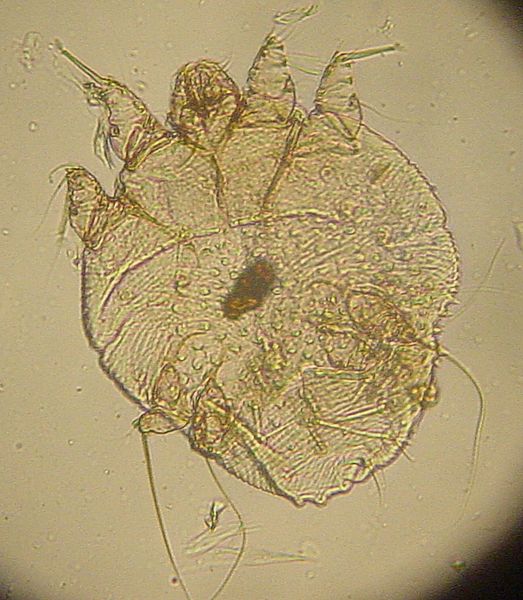Psorinum (Psor.)
 Psorinum is prepared from the fluid of blisters from scabies infested skin. Once potentised none of the original fluid remains but the energetic effects of the remedy will treat a range of complaints. Those who need Psorinum usually lack vitality and are prone to mental disturbances. They catch infections easily, especially colds, and recover slowly. Skin complaints are common and if unattended will be dirty and offensive but these days with frequent bathing and access to steroids, are less likely to be so. The person is also likely to be anxious about health, work, poverty and the future which leads to depression, despair and sometimes, suicidal thoughts.
Psorinum is prepared from the fluid of blisters from scabies infested skin. Once potentised none of the original fluid remains but the energetic effects of the remedy will treat a range of complaints. Those who need Psorinum usually lack vitality and are prone to mental disturbances. They catch infections easily, especially colds, and recover slowly. Skin complaints are common and if unattended will be dirty and offensive but these days with frequent bathing and access to steroids, are less likely to be so. The person is also likely to be anxious about health, work, poverty and the future which leads to depression, despair and sometimes, suicidal thoughts.
Common Uses
When the remedy matches the symptom profile, Psorinum has the ability to treat conditions such as abscess, acne, allergy, asthma, bronchitis, colds, depression, dermatitis and eczema, headaches, insomnia, middle ear infections, pharyngitis, phobia, psoriasis, scabies and lice, ulcers.
Home Treatment Guidelines
Acute, Self-Limiting Conditions
Conditions like colds or minor injuries, which are short-term and typically improve on their own, can be managed at home with homeopathy. However, in emergencies or if symptoms worsen, contact your healthcare provider.
Chronic Conditions
These home treatment instructions do not apply for ongoing issues, whether mentioned above or not, like persistent allergies or chronic pain. You should consult a qualified homeopath for a personalized treatment plan to achieve the best results with homeopathy for chronic conditions.
How to Take the Remedy for Acute Conditions
- Take one pill or five drops of the remedy. The frequency depends on symptom severity. As examples:
- For life-threatening symptoms, take every 1 minute and seek emergency help immediately.
- For mild symptoms, take every 4 hours.
- Stop taking the remedy once you feel better. Resume if symptoms return.
- If no improvement after four doses, choose a different remedy or consult a professional homeopath.
- For more details on dosing, refer to: How Often to Dose with a 30C Homeopathic remedy.
- For information on the different potencies, read: Guidelines on which potency to use
Additional Notes From Past Masters
Homeopathy is a 200-year-old system of medicine. Early homeopaths recorded detailed notes on how remedies worked, including initial tests, remedy relationships, and their experiences. These writings were shared to improve homeopathic practice and now offer fascinating insights into past uses of homeopathy. Here’s an example, edited and modernised for clarity, from Leaders In Homoeopathic Therapeutics (1898) by E. B. NASH M.D.:
From the Old Masters
Nash says:
Very sad, hopeless, despondent; “bluest of the blue.” Great debility; sweats on slightest movement; wants to give up and lie down. Eruptions on the skin, dry, or moist; or skin scaly and dry as parchment; dirty, the great unwashed, unwashable. Intense itching of skin < in warmth of bed. Discharges and exhalations exceedingly offensive. Very sensitive to cold air; wears a fur cap in summer. Modalities: < in cold air, < in warmth of bed (itching); sitting up or motion; > bringing arms down close to the body, > lying down (even the dyspnœa); wrapping up warm; psoric manifestations. Great weakness and debility; from loss of fluids; remaining after acute diseases; without any organic lesion or apparent cause. Cough and dry, scaly eruptions return every winter. Quinsy; to eradicate the tendency.
Lippe says:
MIND AND DISPOSITION Anxiety about the future. Despair of recovery, thinks to be very ill, and in great danger not to survive the sickness ; hopelessness. Great anxiety, full of fears. Religious melancholy. Impatience ; ill humor. GENERALITIES Very weak from the least exertion. Great debility from loss of fluids or after severe acute diseases (Typhus). Rheumatism and arthritis. Dropsical diseases. CONDITIONS Psor. is an indispensable remedy if debility remains after violent acute diseases ; if profuse perspirations remain after typhus fever ; in the evil consequences of suppressed itch, especially after large doses of sulphur ; if the patient is hopeless, despairing of his recovery. Many ailments are worse or come on when riding in a carriage, and when exercising in the open air, and relieved by rest and in the room. Aggravations in the evening and before midnight. Sitting aggravates the dyspnœa (asthma) and pain in the heart ; these and other ailments are relieved while lying clown.
Hering says:
MIND Thoughts vanish, after overlifting. Memory so weak, cannot remember, does not even know his room. Thoughts which he cannot get rid of ; they constantly reappear in his dreams. As if stupid in left half of head, morning. Dull, stupid, foggy, as after a debauch, on awaking in night ; dizziness he falls down. Dull all forenoon disinclined to work. Sad depressed ; even suicidal thoughts. Despairs of recovery ; thinks he will die, hopeless ; especially after typhus, better from nosebleed. Religious melancholy. Anxiety, full of fears, of evil forebodings. Sentimental. Cheerful, takes pleasure in his work. Irritable, peevish, passionate, noisy ; nervous, easily started ; restless, hands tremble. Mental labor causes : fulness in head ; intense headache ; throbbing in brain ; pain in left temple. Every moral emotion causes trembling. Severe ailments from even slight emotions. TISSUES Body always has a filthy smell, even after a bath. Thinner than usual ; pale, exhausted. Deeply penetrating ichorous ulcers. Carries. Dropsy. STAGES AND STATES Scrofulous, nervous, restless, easily startled. Psoric constitutions ; especially when other remedies fail to permanently improve ; lack of reaction after severe diseases. Pale, sickly, delicate children.
More Information
Guidelines on which potency to use
Sources
Lippe A. M.D. 1886. Textbook of Materia Medica. 1886. Publishers: A.J. Tafel Hering C. 1877. Condensed Materia Medica. Publishers: Boericke and Tafel Nash E.B. 1899. Leaders in Homoeopathic Therapeutics. Publishers: Boericke and Tafel






